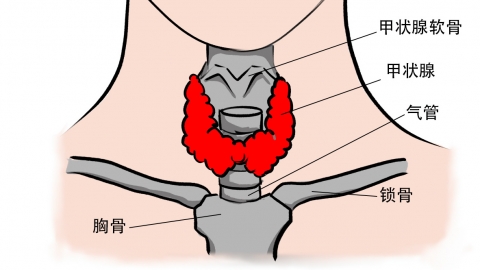How are thyroid nodules caused?
Generally, thyroid nodules may be caused by abnormal iodine intake, excessive mental stress, Hashimoto's thyroiditis, thyroid adenoma, hyperthyroidism, and other factors. If discomfort symptoms occur, timely medical consultation and treatment at a regular hospital are recommended. Detailed explanations are as follows:
1. Abnormal Iodine Intake
Long-term excessive or insufficient iodine intake can affect thyroid hormone synthesis, leading to thyroid tissue hyperplasia and formation of nodules. It is important to maintain a reasonable iodine intake, carefully control the amount of iodized salt consumed, avoid excessive consumption of high-iodine foods such as kelp and nori, and also avoid completely eliminating iodine-containing foods from the diet.
2. Excessive Mental Stress
Long-term mental tension and anxiety can affect the endocrine system, causing thyroid hormone secretion disorders and inducing thyroid nodules. Learning to regulate emotions and relieve stress through listening to music, exercising, and communicating with others is recommended. Maintaining a calm and balanced mindset and avoiding prolonged periods of tension are important.

3. Hashimoto's Thyroiditis
This is an autoimmune disease in which the immune system attacks the thyroid tissue, causing chronic inflammation and leading to thyroid hyperplasia and nodule formation, possibly accompanied by abnormal thyroid function. Patients should follow medical advice to take medications such as levothyroxine sodium tablets, selenized yeast tablets, and methimazole tablets.
Excessive secretion of thyroid hormones can stimulate thyroid tissue, potentially causing thyroid nodules, often accompanied by symptoms such as palpitations, excessive sweating, and weight loss. Patients should follow medical advice to take medications such as propylthiouracil tablets, methimazole tablets, and propranolol tablets.
5. Thyroid Adenoma
This is a benign tumor formed by abnormal proliferation of thyroid follicular epithelial cells, presenting as thyroid nodules, which generally grow slowly. Regular hospital follow-ups are necessary to monitor changes in nodule size. If the nodule is large, appropriate treatment can be considered after medical evaluation.
In daily life, maintaining a regular sleep schedule and avoiding staying up late; eating a balanced diet with proper nutrition; and undergoing regular thyroid examinations for early detection and early intervention are recommended.




